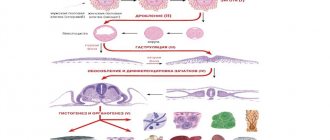Doctors draw the attention of patients to the fact that difficulty urinating during pregnancy is a common deviation. At the same time, women who are expecting a child note an increased urge to urinate and discomfort during urination. This condition can be provoked by a number of factors, both physiological and pathological. That is why, in case of disturbances during urination, it is important not to self-medicate, but to visit the attending physician to identify the cause that provoked the deviation from the norm.
“Oh, I can’t!”, or How many times is it normal for pregnant women to walk small?
“Pregnancy is when you want to eat and pee all the time!” – that’s what a famous radio host once joked.
And while pregnant women can still somehow cope with the desire to devour another bun, running to the toilet can sometimes drive them crazy. Here's how women describe their feelings:
“I fly, not run. Probably every 15 minutes. It's just terrible." “I rarely went before, but now it feels like we’re gaining momentum, more and more every week.” “I, too, have become like a toilet duckling! It’s generally exhausting at night.”
Meanwhile, experts assure: most often this is normal. The pregnant body makes an inversion jump. The metabolism is reconfigured in order to adapt to new conditions and cleanse itself, including through frequent urination. It is believed that this will normally be the case until the fourth month. Then everything returns to normal again, and closer to childbirth it happens again, but for a different reason. The uterus and baby take up maximum space and leave little freedom for other organs. However, experts have not yet decided how many times it is normal to go to the toilet. For an average person, some people take up to ten times during the day, and one or two at night. But how can a lady in this position understand that her “races” are not a sign of dangerous inflammation?! And this is possible, and quite often, urologists admit.
It makes sense to see a doctor if your trips to the toilet are accompanied by pain or burning , doctors say, especially if your body temperature is elevated and you feel unwell. Another alarming sign is if, despite the unbearable urge, only a few drops come out of the bladder. These symptoms often indicate infection or inflammation of the bladder or kidneys. All this can cause infection of the baby, amniotic fluid and complicate the course of pregnancy.
Inflammation must be treated immediately, otherwise it will become chronic and can cause pyelonephritis. During pregnancy, kidney inflammation is treated in a hospital under the supervision of nephrologists, gynecologists and urologists. Then antibiotics, uroseptics and herbs allowed when carrying a child are already required.
Krasnoyarsk urologist Sergey Valerievich Pavlovsky believes that often “. A woman's problems begin even before pregnancy. Many women suffer from cystitis and other inflammations, but no measures are taken. There may be cystalgia, the clinical picture is exactly the same as for cystitis, but the treatment required is completely different. Treatment when a woman is already pregnant can only be carried out according to strict indications and after examination. If it is pressed, in order to maintain and prosper the pregnancy, it is even more necessary to consult a doctor, and not to treat yourself. First of all, to make a diagnosis you will need a general urine test, ultrasound of the kidneys, and consultation with a gynecologist to ensure there are no problems with the fetus. Be sure to know the volume of urine (is it urinating drop by drop or is there some volume). It must be remembered that any therapy or medication is a double-edged sword and can therefore create big problems for the fetus and mother. You can only increase the volume of fluid consumed on your own, up to 1.5 liters, and even then if there is no swelling of the lower extremities. There are a lot of options for what exactly is happening to a woman, so the first thing you need to do is seek advice.”
Another serious non-inflammatory ailment is overactive bladder . An overactive bladder is said to occur when you urinate more than 8 times a day (this figure may vary). The disease, as many may be surprised, is common. It affects approximately a quarter of the population of developed countries. Usually the disease manifests itself with such a strong urge to urinate that the patient cannot resist. Sometimes patients experience incontinence and urinary incontinence. And here the main problem is that those suffering from an overactive bladder rarely seek qualified medical help. It doesn't hurt. So, according to WHO estimates, less than half of people abroad consult a doctor with this problem. In Russia this figure is significantly lower.
It is clear that in pregnant women all this is aggravated by natural causes. The symptoms become so aggravated that there is no longer any strength to endure, but during this period treatment is not always possible, says urologist Vladislav Chernyshev. “If it’s difficult to tolerate, consult a doctor, he will make a diagnosis, prescribe treatment, and give recommendations. Of the drugs used for hyperactivity, m-anticholinergics are most often used. Physiotherapy is possible. There is a method of training the bladder where the urge is tolerated for as long as possible.” To help a woman, an examination will be needed in any case. As a rule, you will have to keep a urination diary - this is when you write down everything you drink and everything that comes out. Laboratory methods are used to assess the functional state of the bladder and kidneys; even consultations with neurologists are prescribed, because this disease is associated with a disorder of the nervous system.
In pregnant women, as a rule, the first step in treatment is non-drug methods, such as:
- Urinating on a set schedule, such as once every two hours. This type of training can help restore lost bladder control.
- It is also necessary to avoid caffeine-containing drinks, such as coffee, tea, carbonated water, citrus fruits and their juices. We'll have to forget about spicy food.
- If you have to wake up frequently at night, you will have to refrain from drinking liquids before bed. This means drinking more during the day.
- Another type of training: when visiting the toilet, empty your bladder as much as possible, then relax for a couple of seconds, try again. This method of urination is recommended to be practiced constantly.
“Pregnant women,” insists doctor Angelina Dengina, “can only do Kegel exercises. This is very useful for any woman, and a must after childbirth. It is better to take medications during the non-lactating period.”
Kegel exercise technique
Kegel exercises are aimed at training the pelvic floor muscles. Pregnant women who do Kegel exercises often notice that labor is less painful and much easier. By strengthening these muscles, you will gain bladder control and may reduce the occurrence of another common pregnancy problem: hemorrhoids. Start by tightening your pelvic floor muscles as if you were trying to stop the flow of urine. Hold for five seconds, then slowly release.
The second option is called "Elevator"
We squeeze the muscles a little bit (1st floor), hold for 3-5 seconds, continue lifting - squeeze a little harder (2nd floor), hold, etc. to your limit. We also mentally go down in stages, lingering for a couple of seconds on each floor. This method is suitable for already trained people. You can do exercises anywhere - while driving a car, while walking, watching TV. Try doing Kegel exercises in different positions—lying, sitting, or squatting.
By the way, in Krasnoyarsk, during yoga classes for pregnant women, trainers introduce Kegel exercises without fail. And there it is performed in different poses (asanas). You need to perform the exercises with an empty bladder. Try not to strain your legs, buttocks or abdominal muscles, or facial muscles.
And yet, before even such training, try to get advice from a specialist. Frequent trips to the toilet, let us remind you, have different reasons, and perhaps the reason is still inflammatory.
Causes of frequent urination in a pregnant woman are normal
The feeling of new life inside, the first kicks of the baby... Pregnancy is truly a magical time that will give you many unusual new sensations. Unfortunately, not all of them will be pleasant - not all expectant mothers manage to avoid toxicosis and other “side effects”. These include frequent urge to urinate during pregnancy.
In the life of every woman, the period of waiting for a child is associated with significant changes occurring in the body. Along with positive emotions and feelings for the future baby, quite unpleasant sensations also arise. One of them is frequent urination during pregnancy.
In the first trimester, especially in the first weeks, an hourly urge to empty the bladder is one of the first signs of successful fertilization. At the beginning of pregnancy they can be triggered by the following reasons:
- hormonal imbalance in the body and its effect on the bladder;
- the process of formation of new amniotic fluid;
- increased load on the kidneys - they need to filter waste products of the expectant mother and baby;
- the growth of the uterus, which every week increasingly displaces neighboring organs and compresses the bladder, thereby reducing its volume.
In the second half of the term, the pregnant woman’s well-being changes. This is due to relatively rare urges, which are explained by changes in uterine growth in the vertical direction. The compression of the organs of the urinary and reproductive systems stops. If a frequent urge to urinate continues to torment a pregnant woman, she needs to inform her doctor about this and undergo general urine and blood tests to rule out infectious pathologies.
In the third trimester, a woman again constantly wants to go to the toilet “in a small way.” Why did the frequent urge to urinate return? The main causes of this condition:
- Growth of the uterus. The uterus becomes so large that compression of the organs of the urinary and reproductive systems is inevitable. The closer the due date, the lower the baby drops, so many patients begin to suffer from involuntary urine leakage when a cough reflex occurs.
- Increased amount of amniotic fluid. They are also regularly renewed, and their mass puts additional pressure on nearby organs.
- Function of the fetal kidneys. At this stage, the fetal kidneys begin to work, the child’s waste products pass through the umbilical cord and are excreted from the body by the mother’s kidneys.
Can pregnant women tolerate the urge to urinate? I want to pee very often—every half an hour or an hour—but I don’t always have the opportunity to get to the toilet. Experts say that waiting out the urge stretches the bladder. Regular restraint weakens the sphincter, which may result in the patient developing urinary incontinence in the future.
During pregnancy, a woman’s body works hard, the immune system weakens, which is fertile ground for the development of infection. A woman should be attentive to changes in her condition. One of the signs of the onset of a latent genitourinary infection is cloudiness of the urine, a change in its color (normal urine in a healthy person is light yellow and transparent).
- urethritis;
- urolithiasis;
- pyelonephritis;
- cystitis.
Ineffective or untimely treatment of these diseases poses a threat to the normal development of the fetus, and in the worst case, provokes the development of intrauterine infection. Treatment of urinary tract pathologies requires the use of antibacterial drugs. In this case, doctors prescribe gentler medications for a pregnant woman.
The sooner the expectant mother consults a nephrologist or urologist, the less need for antibiotics. If the disease is nevertheless diagnosed, the patient should under no circumstances self-medicate. Some antibacterial drugs are allowed to be used during pregnancy, but their dosage should only be calculated by a specialist.
Since pregnant women are at risk due to reduced immunity, they should follow measures to prevent diseases of the urinary system. If a woman is sure that frequent urination during pregnancy is not associated with pathological causes, you can use simple ways to alleviate the condition, including:
- Timely emptying of the bladder. Many pregnant women do not fully understand why they cannot tolerate going to the toilet “in a small way.” Otherwise, they put themselves at risk of developing an inflammatory process.
- Avoiding thirst-inducing foods and diuretic foods. Pregnant patients should limit the consumption of zucchini, melon, watermelon, and fresh and dried fruit compote.
- Monitoring your fluid intake. A pregnant woman should not violate the drinking regime, the daily minimum is 2 liters per day. You should distribute the water so that you drink most of it while at home or near the toilet. For a restful sleep, pregnant women need to drink the last glass of water no later than 1-2 hours before going to bed.
- Selectivity in choosing clothes. Clothing, especially underwear, should not squeeze the stomach. A pregnant patient should choose loose-fitting blouses and dresses, as well as high-waisted briefs and trousers.
- Refusal of daily hygiene products. Regular use of pads entails the development of candidiasis. If a woman has discharge, it is better for her to change her underwear as often as possible.
- Complete emptying of the bladder. Patients often complain of incomplete emptying. Doctors recommend bending forward in this case. They help compress the bladder, resulting in emptying.
Patients in the position may face another problem - rare urination. If a woman pees little while pregnant, she should consult a urologist, nephrologist or gynecologist.
Rare urination during pregnancy indicates a lack of fluid intake. This condition is dangerous for a patient in this position, since the risk of developing pathologies of an infectious and inflammatory nature in the organs of the urinary system increases. Women rarely pee, usually only in the early stages. In the later stages, they constantly want to go to the toilet, regardless of the amount of liquid they drink.
Frequent urge to urinate during pregnancy is a completely natural and understandable phenomenon. And the likelihood that a woman will observe it in herself is quite high, because there is more than one reason for the increased work of the kidneys and bladder.
Thus, these organs are also involved in the large-scale process of hormonal changes. The frequency of urges is affected by an increase in the total volume of fluid in the pregnant woman’s body. This includes blood and amniotic fluid, which, by the way, is renewed every three hours, which is why the expectant mother is also forced to go to the toilet more often.
At this time, the kidneys experience a double load; they work for two and remove waste products from both the female body and the baby’s body. So it is quite natural that you will have to go to the toilet more often.
But the most obvious reason is the growth of the uterus and fetus, which puts pressure on the bladder, forcing it to empty. And the longer the period, the stronger this pressure. True, from about the 4th month of pregnancy, the uterus moves slightly into the abdominal cavity, giving the bladder the opportunity to “breathe” more easily. But by the end of the term, the pressure returns with even greater force, because the baby begins to descend, preparing to go out into the world.
Frequent urge to urinate while carrying a child is a natural and understandable phenomenon. There are enough reasons for the kidneys and bladder to work intensively during this period.
When frequent visits to the toilet during pregnancy are not complicated by additional symptoms, there is no reason to worry. However, if discomfort is added, such as burning and pain during urination, pain in the lower abdomen or in the lumbar region, or increased temperature, this requires consulting a doctor.
DETAILS: Antimicrobials for urology
Burning sensation when urinating during pregnancy is sometimes associated with changes in the functioning of the excretory system. In the later stages, the uterus and fetus compress the urinary canals, which causes discomfort.
But more often, women who are carrying a child experience worsening chronic problems of the genitourinary system: stones and sand in the kidneys, and other pathologies. If you experience a burning sensation when going to the toilet, you should contact a gynecologist so that he can help you find the cause of the discomfort and prescribe treatment.
Pregnancy is a time when a woman’s body is vulnerable and susceptible to disease. Pain and burning when urinating during pregnancy, unfortunately, is a common symptom during the period of waiting for a baby, which can become an alarm bell and a reason to immediately consult a doctor.
A pregnant woman should not only carefully monitor her health, but also pay attention to the appearance of changes in the body. Frequent urination with a burning sensation in the first and last weeks is physiological in nature or may indicate the course of infectious diseases.
Pregnancy is a period of dramatic changes in the work, structure and functioning of the organs and systems of the body of the expectant mother, therefore some symptoms are characteristic only for this period. Pain during urination is not only a characteristic symptom of pregnancy, but also one of its first signs. This can happen for several reasons.
- The structure of the internal organs of women during pregnancy changes, so when the fetus appears in the cavity and increases in volume and weight over time, a process of compression of the internal organs, namely the bladder, occurs. Due to this, the volume of urine accumulated in the bladder is not completely released, causing discomfort in the lower abdomen during urination and for some time after that. If the fetus lies correctly, the uterus has no structural abnormalities and no pathologies are observed in the pregnant woman, pain during urination occurs extremely rarely, mainly in the late stages of pregnancy, when the fetus can press on the urethra by its own weight.
- Cystitis causes pain when urinating in pregnant women. Since expectant mothers experience compression of the bladder by the fetus, urine stagnates inside it, harmful microelements do not leave the body in time, but form a favorable environment for the development of pathogenic microbes that cause infections of the urinary system. Thus, cystitis appears, the symptoms of which cause pain when urinating.
- Infections of the urinary tract and genital organs, such as candidiasis, trichomoniasis and colpitis, cause pain when urinating. If infections are cured on time, the symptoms of burning, squeezing and discomfort when urinating do not bother the expectant mother.
- Stones and sand in the kidneys can be present in any woman and not make themselves felt, but with the onset of pregnancy and changes in hormonal levels, stones and sand can leave the body, causing itching, burning and pain when urinating.
- Some infectious diseases of the upper respiratory tract, genital tract infections, medications, food, and hypothermia can give symptoms of cystitis and cause pain when urinating.
Why does constipation occur during pregnancy?
Constipation not only causes physical discomfort, but also psychological discomfort. During pregnancy, you have to protect yourself from everything, and even taking laxatives without consulting a doctor is impossible. What should a woman who cannot go to the toilet do?
Firstly, understand that you don’t need to solve the problem of constipation itself, but look for the root cause. That is why you will have to tell the doctor about the problem that has arisen, because if you remain silent, you may encounter much more unpleasant conditions.
The most logical explanation for constipation is an enlarged uterus. The abdominal organs are located in close proximity to each other, so such a significant increase in the uterus can put pressure on the intestines. Because of this, peristalsis is disrupted, which leads to difficulty in passing feces.
The uterus also compresses the rectum, which also interferes with the movement of excrement through it.
Because the uterus has grown, the blood vessels also suffer: when the organ compresses them, blood stagnation occurs, which, in turn, provokes the development of hemorrhoids and constipation. Hemorrhoids, by the way, create psychological preconditions for constipation: a woman is simply afraid to go to the toilet, fearing pain and prolapse of hemorrhoids.
The body of a pregnant woman provides protection to the baby. Excessive intestinal peristalsis can provoke premature labor, so the organ’s susceptibility to filling impulses is reduced.
All of the above reasons relate to late periods, but sometimes an unpleasant condition occurs in the first trimester. It is no longer possible to explain constipation by the growth of the uterus, so the reasons must be sought among the following:
- An increase in the blood level of progesterone, one of the female sex hormones. Its secretion increases during pregnancy, so this consequence is not uncommon: progesterone reduces the tone of smooth muscles, including the intestines.
- The layer of smooth muscles of the uterus and intestines have a common innervation, so the sensitivity of the pelvic plexus is reduced: a stronger stimulus is required for the act of defecation.
- Changes in the taste preferences of the expectant mother. Sometimes a woman during pregnancy suddenly changes her diet to a less healthy one. If there is less and less plant fiber in a woman’s menu, constipation cannot be avoided.
- Insufficient fluid intake. This problem can occur at any stage of pregnancy, as the woman experiences swelling and tries to drink less. At the same time, the consistency of stool changes, and constipation occurs.
- Sedentary lifestyle. If there is a threat of miscarriage, women in the early stages are forced to remain in bed. Lack of physical activity often causes constipation.
Another reason for constipation lies in the psychological state of the pregnant woman. Expectant mothers are prone to excessive suspiciousness and anxiety; it seems to them that any unnecessary movement can be dangerous for the baby. Therefore, they are simply afraid to go to the toilet, and even more so - to push. This problem is more common in later stages, but in particularly restless and emotional women it may appear earlier.
Causes of pain when urinating during pregnancy
Constant, mild, but persistent pain in the lower abdomen at any time during pregnancy is an alarming sign that indicates a possible manifestation of infectious cystitis.
DETAILS: Urine culture tank during pregnancy
Cutting and burning, pain in the lower abdomen and cloudy urine are the main signs of existing pathological flora during pregnancy. This development of pathological bacteria can disrupt the functioning of the filtering organ, indirectly affecting the proper development of the child.
Signs of an infectious disease of the genitourinary system in a pregnant woman:
- cloudy urine. The liquid may immediately become cloudy, or it may settle and acquire cloudy flakes;
- pain when urinating in the side of the abdomen, which radiates to the side or across;
- frequent urge to urinate with a small amount of dark orange fluid;
- stagnant urine odor with a pronounced orange tint;
- The discharge is transparent with an admixture of yellow pus, which flows randomly onto the underwear.
It is important not to confuse simple vaginal discharge that is present during pregnancy and pathological changes in the urethra. It is worth remembering that secretion increases during pregnancy, and therefore if yellowish secretion is observed on your underwear without accompanying pain symptoms, most likely this is a discharge provoked by progesterone; in this case, you should not worry.
But in general, treatment consists of following a diet and excluding spicy, fatty, sweet and salty foods from the pregnant woman’s diet. Sometimes this is enough, but if urinary tract infections are detected, the pregnant woman is prescribed antibiotic therapy. For this purpose, drugs such as Trichopolum, Metronidazole, Canephron, Cyston, Nitroxoline are used.
In some cases, if the infection has not spread deep into the bladder, the disease is treated locally by prescribing antibiotic suppositories. Drugs and doses are determined by the doctor with extreme caution so as not to harm the body of the unborn child, because During pregnancy, the baby's organs and systems are formed, and some medications prevent this.
In cases of urolithiasis, the period of therapy for a pregnant woman can last from 2 weeks to a month, depending on the degree of the disease. This is due to the fact that the pregnant woman needs to influence the kidney stones and try to remove them painlessly. If the stones are large and cannot be removed, the pregnant woman is prescribed injections of anti-inflammatory drugs and is prescribed a strict diet for the entire period of pregnancy.
If the cause of pain when urinating is sand in the kidneys, medications are prescribed that remove sand from the kidneys painlessly, and then antibiotic therapy is started. For severe pain and pain, antispasmodics are prescribed: Spazmalgon, Spazgan, Analgin, No-shpa and other drugs.
In some cases, when pain during urination during pregnancy is not associated with the development of urinary tract pathologies, herbs are prescribed to the expectant mother with caution. Thus, decoctions and juices of plants such as horsetail, dill seeds, as well as black currant leaves, turnip (juice) and rose hips (decoction) have a diuretic effect on the body of a pregnant woman and have a positive effect on the process of intrauterine development of the child, because they have contains a huge amount of vitamins and microelements.
In the process of intense urination, urine does not stagnate in the body, the sediment of microelements in the bladder does not have time to form stones, inflammation also does not have time to develop, and a natural process of cleansing the body occurs. But therapy with medicinal herbs should be strictly under the supervision of a doctor, who determines the duration of treatment and dosage.
You should not self-medicate and put off going to the doctor. At the later stages of visiting a doctor, it is much more difficult for a pregnant woman to be cured, because by this time concomitant diseases have time to develop, and signs of certain pathologies in the fetus appear. Then the treatment process can last from several weeks to several months.
Often, pregnant women may be bothered by cramps or pain during urination. During pregnancy, this symptom occurs much more often than in normal life. This is due to various changes occurring in the body during this period.
And, if you don’t have to worry about the physiological origin of such manifestations, then the pathological disorders hidden behind the common symptoms require a timely response. However, any action can be taken only after finding out the cause of pain when urinating.
Leave 2,269
If urination during pregnancy is accompanied by pain and cramping in the abdomen, while the discomfort does not go away and intensifies, you need to urgently go to the hospital, since such symptoms indicate the presence of inflammatory processes in the organs of the genitourinary system and kidneys.
However, cramps when urinating in women during pregnancy also cause other changes in the body, so it is important to correctly determine the root cause of the pathology and prescribe appropriate therapy.
Many expectant mothers wonder: how often can urination be considered normal in their position? There is no specific answer - as already noted at the beginning of the article, it all depends on the individual characteristics of each woman’s body. It is much more important that frequent urination is painless.
Pain, itching and burning in a pregnant woman when urinating may indicate cystitis or exacerbation of kidney stones. Both diseases pose a danger to the mother and the unborn baby.
Is it possible to push a little during pregnancy?
In general, any effort in the toilet during pregnancy is undesirable. Experts recommend abandoning such amateur activities, reporting the problem to your doctor and finding another way out of this situation.
However, some doctors claim that minimal efforts cannot harm either the expectant mother or the fetus, provided that the pregnancy is easy and the woman feels well. The presence of various threats is an absolute contraindication to attempts. Contraindications are:
- Uterine tone;
- Threat of miscarriage;
- Threat of premature birth;
- Dilatation of the cervix;
- Any pathological discharge, the cause of which has not been established;
- The onset of contractions or the breaking of amniotic fluid.
In any case, the need for constant effort during bowel movements should not be present during pregnancy. If such a problem occurs once, you need to inform your doctor about it and find a solution in case of repeated constipation.
Physiological explanation of the condition
Absolutely every woman carrying a child in the second, third, and sometimes in the first trimesters faces the problem of frequent urination. Many people ask questions: Why do I often go small? Is frequent urination normal during pregnancy? etc., and are completely in vain to worry about this, because this phenomenon is provoked by the influence of a number of factors:
- Enlargement of the uterus and fetus. This is the main reason for frequent urge to go to the toilet. Due to the growth of the uterus, the bladder (UB) begins to experience increased pressure, which causes the desire to empty it. In the later stages, the urge to urinate may turn out to be false, this is due to the fact that the fetus is preparing for birth, the uterus drops significantly and greatly irritates the uterus. There is a desire to go to the toilet, even if urine has not yet accumulated.
- Hormonal changes. During pregnancy, the expectant mother's body intensively produces the hormone hCG, which increases the amount of urine produced. In addition, the muscles and tissues of the urethra become more sensitive due to increased blood flow to the pelvic area, which leads to increased urination.
- Regular renewal of amniotic fluid. The water is renewed every 3 hours, the woman’s kidneys experience double load, because... excrete metabolic products for two, which leads to a frequent desire to empty the bladder.
Also, frequent urination can be caused by consuming diuretic foods and drinks, for example: watermelon, melon, tomatoes, chicory, tea, chamomile infusion and much more. In addition, after eating sweet, salty, fatty, smoked foods, thirst appears, the replenishment of which leads to an excess of fluid and, as a result, frequent trips to the toilet.
Ways to relieve frequent urination during pregnancy
Here is a list of useful tips that will help the expectant mother to some extent “calm” her bladder:
- You can reduce frequent urination during early pregnancy by avoiding foods that make you thirsty. These are products with a pronounced spicy, salty or smoky taste.
- Don't forget about foods and drinks that themselves are diuretics. This includes coffee, tea, rosehip decoction, berry fruit drinks, fresh cucumbers, zucchini, melon and everyone’s favorite watermelon.
- At the slightest signal from the body to relieve the bladder, this must be done immediately - under no circumstances should you endure it for long. If possible, you should avoid public places where it is impossible or problematic to visit the toilet on demand.
- Underwear should fit loosely around your lower abdomen and not squeeze it.
If, when a pregnant woman laughs or coughs, urine involuntarily leaks in small portions, this problem cannot be solved with the help of daily sanitary pads, which provoke the development of vaginal candidiasis (thrush). The way out of this unpleasant situation is to change your underwear more often.
To empty yourself completely, while urinating, you need to tilt your body forward and tense slightly. This position relieves the bladder of additional pressure from the uterus and baby, allowing all urine to pass out unimpeded.
I often pee at night during pregnancy - is this normal?
Frequent urination is especially noticeable at night. For an ordinary person, 1-2 trips to the toilet are considered normal; a pregnant woman may experience real discomfort in this regard; the frequency of visits to the toilet can reach 10-20 per night, and the interval between them can be reduced to 15-30 minutes. In this case, the urge may appear even when the MP is almost empty. All this can seriously worry a woman carrying a child, which is often completely in vain, because for pregnant women this is considered the norm.
In what cases does the condition indicate the presence of disease and what could it be?
If emptying the bladder is not accompanied by any unpleasant or painful sensations, then there is no cause for concern. Otherwise, a woman carrying a child should definitely consult a doctor with complaints. There may be a pathological process occurring in the body that requires immediate treatment, for example:
- sexual infections,
- tumor-like neoplasms,
- pyelonephritis,
- cystitis, etc.
Diseases of the urinary and reproductive tract can threaten the development and health of the unborn baby; in order to prevent this, a thorough diagnosis will be required to determine the cause of the disturbing symptoms.
Treatment methods
I can’t urinate - what should I do? The answer to this question depends on the cause of the problem. In any case, if you have urinary disorders, you should consult a specialist. Moreover, this problem is dealt with by doctors of several specialties:
- urologist;
- neurologist;
- nephrologist;
- oncologist.
Therefore, it is more advisable to first go to a general practitioner or family doctor, who will be able to determine which specialist is best to contact next.
But it takes some time to eliminate the cause of the disease. If you hear the complaint “I can’t urinate,” what should a man or woman do as quickly as possible? Regardless of gender, a bladder catheterization procedure is performed. A tube is inserted into the urethra and reaches the bladder. This way you can quickly ensure normal urine flow.
When is the best time to see a doctor?
The following symptoms should prompt you to consult a doctor:
- burning, stinging and pain when urinating, a feeling of incomplete emptying of the bladder, a small amount of urine excreted, painful urinary incontinence;
- painful pulling sensations in the lumbar region, abdomen;
- change in urine color (darkening), cloudiness, presence of blood, pus clots, sediment.
The above signs may indicate the development of inflammatory processes in a woman’s body. Symptoms often appear suddenly and may be accompanied by increased body temperature, fever, chills, and general poor health.
What tests will need to be taken and examinations completed?
If signs appear that may indicate the presence of a urinary tract infection, a pregnant woman should undergo:
- general blood analysis;
- general urine analysis and bacterial culture.
The expectant mother undergoes all these examinations without fail when registering, i.e. Doctors can identify not only diseases that have a pronounced clinical picture, but also pathologies with an asymptomatic course, for example, asymptomatic bacteriuria.
Asymptomatic infections in 25% of cases lead to kidney infection, which is a threatening condition for both the unborn child and the pregnant woman. Therefore, during pregnancy it is important to take all tests so that the doctor can detect the disease in a timely manner. If abnormalities in the development of the urinary system or disruption of its functioning are suspected, an ultrasound of the kidneys is prescribed.
Diagnostics
When searching for the cause of urinary dysfunction, you should pay attention to both the clinical manifestations that accompany urinary retention and data from additional laboratory and instrumental examination methods.
After a thorough conversation with the patient and his examination, it is possible to establish the presence of acute urinary retention, and sometimes to assume the probable nature of its origin. Only after collecting complaints, anamnesis and examination, additional examination methods are prescribed:
- Ultrasound examination (ultrasound) - allows you to evaluate the structure of the bladder, prostate, urethra. With its help, mechanical obstruction of the urethra, inflammatory processes, and neoplasms are clearly visible.
- Magnetic resonance imaging (MRI) of the spinal cord is performed if the neurogenic nature of urinary retention is suspected.
- Cystoscopy is an examination of the bladder using a small camera. Allows you to visualize obstruction, changes in the walls of the bladder, and determine the amount of urine in it.
- Retrograde cystourethrography is an x-ray method for examining the organs of the urinary system.
During a diagnostic search, it is necessary to clearly differentiate urinary retention from anuria. The latter occurs when there is a violation of urine excretion by the kidneys.
How can you alleviate the problem yourself?
To minimize the discomfort caused by frequent emptying of the bladder, the expectant mother should follow a few simple recommendations:
- Limit the intake of foods that cause thirst, for example, smoked, salty, fried foods, etc.
- In the evening, reduce fluid intake. To avoid having to get up to go to the toilet at night, it is recommended to limit your fluid intake a few hours before bedtime.
- Reduce the amount of diuretic foods in the diet, for example, cucumbers, watermelon, tea, coffee, etc.
- Wear loose clothing, especially underwear, so that the fabric does not put pressure on the lower abdomen and does not provoke frequent urge to go to the toilet.
- If an expectant mother is going to purchase a prenatal bandage, then it is better to give preference to models that can be easily removed, so as not to experience additional inconvenience when visiting the toilet.
- To completely empty the MP, it is recommended to lean forward a little.
Even if the urge to go to the toilet appears every half hour, a pregnant woman is not recommended to endure and hold back for a long time. Otherwise, the walls of the bladder may stretch and weaken, which will ultimately lead to difficulty retaining urine or even incontinence. If possible, you should limit visits to places and trips where you will not be able to go to the toilet for a long time.
How to deal with constipation during pregnancy
- Get on all fours. The palms are located under the shoulders, the knees are under the hip joints, the back is straight. Raise your right hand and reach down to the left. You can slightly bend your supporting arm at the elbow. Repeat on the second side.
- Sit on the floor, knees straight, a towel cushion under your buttocks, hands on your hips. Bring your straight right arm back, turning your body and head to the right. Repeat in mirror image.
- Sit on the floor with your back against the wall, knees slightly bent. Take a deep breath into your belly, then exhale. Try to keep your chest still. Breathe like this for 3 minutes.
- Lie on your back. Feet are on the floor, knees slightly bent. Touch the heel of your right foot to your left knee. Repeat for the other side.
- The position is the same, but the hands lie spread out to the sides on the floor, palms up. Rotate your pelvis to the right, trying to place your knees on the floor. Return to original. Repeat on the other side.
- Lie on your back with your legs straight. Raise your right leg and try to touch your bent knee to your right shoulder, moving your hip slightly to the side. Repeat for the left leg.
Interesting: Can Your Period Be Delayed After Taking Birth Control?
Tension in the urinary system of a pregnant woman - is this normal and what complications can there be?
Not completely relaxed muscles of the bladder significantly complicate the process of emptying it and cause disruption of the functionality of the organ. Sluggish urination, frequent trips to the toilet and a feeling of unfinished urine excretion are symptoms of increased bladder tone - hypotension. A decrease in contractility when the organ is filled can cause stagnation and, as a consequence, infection, salt deposition, and vesicoureteral reflux. During pregnancy, the fetus puts pressure on the muscular walls of the organ, which can affect the development of this pathology, so it is very important to monitor the condition of the bladder during pregnancy and get tested in a timely manner.
The frequency of the urge to go to the toilet is individual in each case. If a woman is worried about frequent urination during pregnancy , which is not accompanied by pain or discomfort, then there is no reason to worry.
Symptoms that accompany urinary retention
Clinical manifestations of urinary retention can be divided into two large groups: symptoms associated with the underlying cause, and dysuric manifestations, which are accompanied by the complaint “I can’t write.”
When the urethra is obstructed by a stone, urinary retention does not occur immediately. First, the patient complains that it hurts to urinate. This symptom appears when the stone travels through the ureters to the bladder and then enters the urethra. Actually, urinary retention develops when the stone stops moving and completely blocks the lumen of the urethra.
Impaired urination due to prostatitis (inflammation of the prostate gland) is also accompanied by the patient’s complaint that it is painful to urinate. In this case, pain in the perineum is associated with swelling of the prostate and irritation of the nerve endings.
If urine output is obstructed due to neurogenic causes, other clinical manifestations may include weakness in the limbs (paresis), impaired sensitivity (hypesthesia) or its complete absence (anesthesia).
A pregnant woman cannot tolerate the toilet. Is it possible during pregnancy?
Why can't you go to the toilet?
In large and modern cities this problem stands apart. Imagine: you live in Moscow and decide to go to your friends at the end of another city. You get on the subway and after 20 minutes you realize that you urgently need to have a bowel movement. How to proceed? There is only one way out - leave the subway and look for a toilet nearby (toilet stalls are prohibited in the subway). It’s good that near most stations there are shopping centers where you can safely go shopping. Well, what should you do if you find yourself in a residential area, where there are not even bushes that can even slightly cover you, when there are a lot of people around? All that remains is to endure. Alas, this is absolutely impossible to do and here’s why.
Imagine a bladder. Its muscular membrane stretches as it fills with fluid, which is why the nerve endings located in it send signals to the brain, as if telling you that it’s time to go to the toilet. If you do not do this, then constant overfilling of the bladder can lead to erosion of its walls, disruption of the outflow of urine and the development of some dangerous diseases. So, girls, for example, may begin to suffer from cystitis or urethritis. Therefore, we advise you to always have a bowel movement in a timely manner as soon as you feel the signal.
By the way, there is one very interesting opinion on this matter - many people suffer not because they have nowhere to go to the toilet, no. It turns out that they are simply embarrassed to relieve themselves in public places! As a rule, this problem begins in childhood, so sometimes only a psychologist can cope with it. However, this difficulty is mostly far-fetched - think for yourself, how does each of us differ from each other? Appearance and character, but when emptying the bladder, there are no differences at all. And then, what is natural is not ugly. Is not it?
General information
The patient's complaint that he cannot write is described in the medical literature as urinary retention. This condition involves problems emptying the bladder, despite its fullness. That is, urine is formed normally, the kidneys are working, but for some reason urine cannot flow out. Its constant presence in the bladder not only leads to the development of unpleasant symptoms, but is also a risk factor for the entry of pathogenic microorganisms and infection of the genitourinary system.
It is noteworthy that at a young age, the inability to urinate occurs equally in both sexes. But with age, men are more likely to experience this problem. This is due to the fact that they may develop pathology of the prostate gland (prostate), which is often accompanied by problems with urination.
Treatment should be aimed at both relieving symptoms, i.e. emptying the bladder, and eliminating the underlying cause. Otherwise, severe complications may develop.









